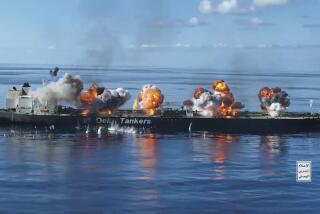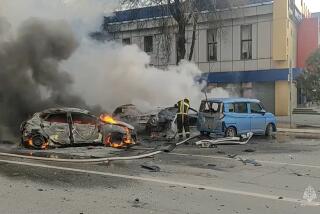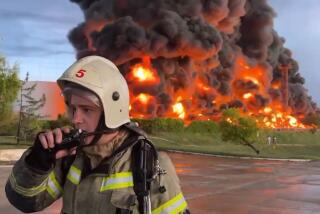Kuwait Oil Facilities Set Afire by Iraqis : Gulf war: The thick black smoke hampers allied air operations. It may be part of Baghdad’s defensive strategy.
- Share via
RIYADH, Saudi Arabia — Iraq began setting fire to the facilities of at least one Kuwaiti oil field today, sending a pall of black smoke into the air that further hindered the air attacks of allied forces.
But it was not immediately clear whether the fire, set at the al-Wafra oil field near the Saudi Arabian border, was the beginning of an expanding strategy or an isolated incident. However, American military officials said it was certain the fires were set by the Iraqis rather than an accident of war.
“We have evidence that it was caused by the Iraqis,” said Lt. Col. Greg Pepin in an early evening briefing. “If there is heavy smoke, obviously it will affect our operation.”
Oil storage tanks were also reportedly on fire today at a pair of major facilities, Shuaiba and Mina Abdullah, next to each other about 60 miles north of the border.
In another development today, Western diplomats said that Saudi Arabia had depleted its supply of jet fuel and had purchased 8 million barrels on the open market to keep the allied coalition’s air force flying. The sources said that, despite the huge Saudi supply of oil, it had not been able to keep up with the needs of an air force that is now flying about 2,000 sorties a day against Iraq.
The smoke emanating from the al-Wafra oil field was only another aggravation to what has already been three days of difficulty for fighter jets bombing targets in both Kuwait and Iraq. Low cloud covers have made the sorties difficult, though the number of flights now stands at more than 10,000.
“The weather has been the only thing that has been on (Iraqi President) Saddam Hussein’s side in the last few days,” British Vice Admiral Bill Wratten said today.
The reason for setting fire to the oil field was still unclear. Before the war began last week, the Iraqis had promised to destroy the oil fields if attacked. But there has been further speculation by analysts that setting fire to the oil fields would be a prelude to withdrawal.
Oil officials said today that they were waiting to receive more photographs to ascertain just how much damage had been caused by the fire. One oil expert familiar with al-Wafra said he strongly suspected that the fire was restricted to the storage tanks, since the wells themselves had not been in use since Aug. 12, in the aftermath of the invasion of Kuwait by Iraq. But he also said that, even if it were the storage tanks, the black smoke could last for three or four days.
“We do not have details of what caused the fire,” one official monitoring the situation in Riyadh said. “We don’t know that it was not the wells, but it is highly unlikely, because of the lack of pressure on the wells in that area.”
An official at Saudi Aramco, the oil giant that produces the majority of Saudi Arabia’s crude, said a fire at any of Kuwait’s oil facilities might produce large quantities of smoke, but would probably not lead to any long-term problems.
“There’s going to be some big fires, so what?” he asked. “We’ve had them. You protect the surrounding area and let them burn out.”
More to Read
Sign up for Essential California
The most important California stories and recommendations in your inbox every morning.
You may occasionally receive promotional content from the Los Angeles Times.













